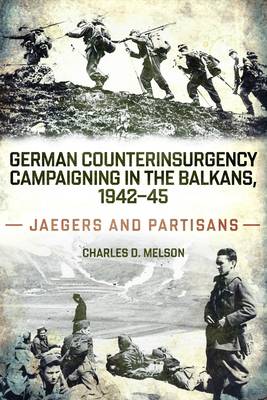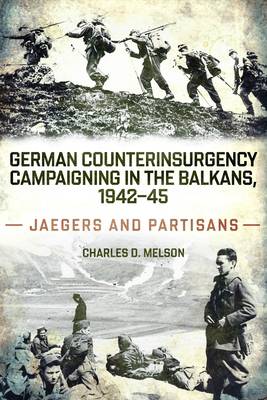
Bedankt voor het vertrouwen het afgelopen jaar! Om jou te bedanken bieden we GRATIS verzending (in België) aan op alles gedurende de hele maand januari.
- Afhalen na 1 uur in een winkel met voorraad
- In januari gratis thuislevering in België
- Ruim aanbod met 7 miljoen producten
Bedankt voor het vertrouwen het afgelopen jaar! Om jou te bedanken bieden we GRATIS verzending (in België) aan op alles gedurende de hele maand januari.
- Afhalen na 1 uur in een winkel met voorraad
- In januari gratis thuislevering in België
- Ruim aanbod met 7 miljoen producten
Zoeken
German Counterinsurgency Campaigning in the Balkans, 1942-45
Jaegers and Partisans
Charles Melson
Hardcover | Engels
€ 52,95
+ 105 punten
Omschrijving
"This work deserves to find a place on the bookshelf of any student of German military history, but especially of anyone seeking to understand the particular issues and imperatives that have influenced the development of the German army and its doctrine for countering guerrillas, partisans, and irregular forces since 1871." - David Stone, LTC, BA, Ret, author of Shattered Genius
An examination of irregular warfare from the perspectives of the Germans and their coalition in the Balkans of Southeast Europe in World War II.
This book traces the evolution of German irregular warfare doctrine from Clausewitz to the Third Reich, examining how theory was applied--and often distorted--through the brutal reality of counterinsurgency in the Balkans during World War II and beyond. Focusing on the 7. SS-Mountain Division "Prinz Eugen" as a case study, it reveals how moral, legal, and operational imperatives clashed in a campaign waged in the so-called "gray zone" of modern warfare.
Drawing on a mix of German primary sources, oral testimony, and critical historiography, the book challenges familiar narratives by engaging with recent debates on Wehrmacht complicity, military ethics, and the reinterpretation of unit histories. It offers a conceptual and operational analysis that moves beyond traditional timelines, instead using a dialectical approach to examine "what" happened and "why" these actions were shaped by the doctrinal ideas of the time.
More than a unit history, this is a philosophical and doctrinal inquiry into how counterinsurgency was understood, practiced, and justified--then and now. It interrogates the space between necessity and atrocity, between tactical effectiveness and moral failure. Essential reading for scholars of military history, ethics, and the long shadow cast by 20th-century counterinsurgency practices.
An examination of irregular warfare from the perspectives of the Germans and their coalition in the Balkans of Southeast Europe in World War II.
This book traces the evolution of German irregular warfare doctrine from Clausewitz to the Third Reich, examining how theory was applied--and often distorted--through the brutal reality of counterinsurgency in the Balkans during World War II and beyond. Focusing on the 7. SS-Mountain Division "Prinz Eugen" as a case study, it reveals how moral, legal, and operational imperatives clashed in a campaign waged in the so-called "gray zone" of modern warfare.
Drawing on a mix of German primary sources, oral testimony, and critical historiography, the book challenges familiar narratives by engaging with recent debates on Wehrmacht complicity, military ethics, and the reinterpretation of unit histories. It offers a conceptual and operational analysis that moves beyond traditional timelines, instead using a dialectical approach to examine "what" happened and "why" these actions were shaped by the doctrinal ideas of the time.
More than a unit history, this is a philosophical and doctrinal inquiry into how counterinsurgency was understood, practiced, and justified--then and now. It interrogates the space between necessity and atrocity, between tactical effectiveness and moral failure. Essential reading for scholars of military history, ethics, and the long shadow cast by 20th-century counterinsurgency practices.
Specificaties
Betrokkenen
- Auteur(s):
- Uitgeverij:
Inhoud
- Aantal bladzijden:
- 304
- Taal:
- Engels
Eigenschappen
- Productcode (EAN):
- 9781636246437
- Verschijningsdatum:
- 1/07/2026
- Uitvoering:
- Hardcover
- Formaat:
- Genaaid
- Afmetingen:
- 152 mm x 229 mm

Alleen bij Standaard Boekhandel
+ 105 punten op je klantenkaart van Standaard Boekhandel
Beoordelingen
We publiceren alleen reviews die voldoen aan de voorwaarden voor reviews. Bekijk onze voorwaarden voor reviews.









